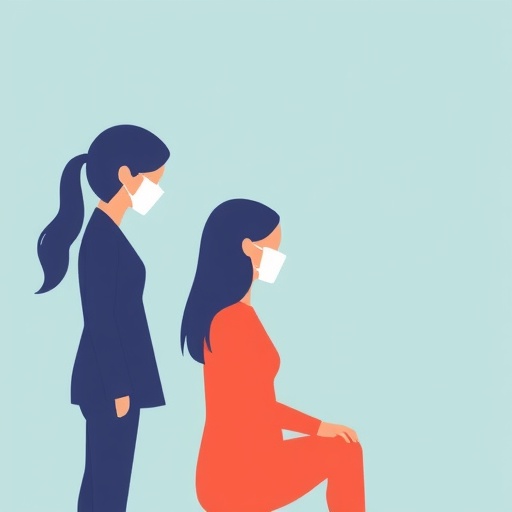Groundbreaking research published in the renowned journal Cell Reports Medicine has unveiled crucial biological distinctions between men and women suffering from long COVID, particularly those exhibiting symptoms akin to myalgic encephalomyelitis/chronic fatigue syndrome (ME/CFS). This pivotal study sheds light on why women disproportionately suffer from more persistent and severe manifestations of the post-acute sequelae of COVID-19, advancing our understanding of sex-specific pathophysiology in this enigmatic syndrome.
Long COVID, medically referred to as post COVID-19 condition, is characterized by neurological, respiratory, and gastrointestinal symptoms persisting or arising more than three months after the initial SARS-CoV-2 infection. Epidemiological data have consistently demonstrated that women are approximately three times more likely than men to develop long COVID, but until now, the biological mechanisms underpinning this disparity remained elusive. The research, led by immunology expert Professor Shokrollah Elahi at the University of Alberta’s Mike Petryk School of Dentistry, employed extensive immunological, hormonal, and transcriptomic profiling on individuals afflicted by long COVID one year post-infection.
The investigative team conducted a comprehensive observational study involving 78 long COVID patients alongside 62 control individuals who recovered fully without chronic symptoms following SARS-CoV-2 infection. Utilizing cutting-edge techniques including immune cell phenotyping, biomarker assessment, and RNA sequencing, the researchers identified a distinctive immunological signature that varied drastically between female and male patients with long COVID. This signature implicates immune dysregulation and systemic inflammation pathways that are potentially sex-specific.
One of the most striking findings highlighted a phenomenon termed “gut leakiness” predominantly in female participants. Elevated plasma concentrations of intestinal fatty acid binding protein (I-FABP), lipopolysaccharide (LPS), and soluble CD14 were observed, all biomarkers indicative of intestinal barrier dysfunction and gut inflammation. This gut permeability allows translocation of microbial products into the bloodstream, fostering a heightened systemic inflammatory state. The study theorizes that female patients may have a biological predisposition for increased vulnerability of intestinal integrity at the earliest phase of SARS-CoV-2 infection, contributing to their prolonged symptomatology.
Moreover, female participants exhibited signs of anemia, denoting impaired erythropoiesis. This was correlated with elevated circulating inflammatory cytokines, suggesting that persistent inflammation might interfere with red blood cell production mechanisms in women with long COVID. Contrastingly, anemia was not a hallmark feature among male patients, a separation that raises significant questions about sex-differentiated inflammatory responses and hematopoietic regulation in post-viral syndromes.
Crucially, the investigation also unraveled pervasive sex hormone imbalances among long COVID patients. The data revealed abnormally low testosterone levels in affected women and diminished estrogen concentrations in male subjects. Furthermore, cortisol levels, a stress hormone integral to modulating immune responses, were reduced in both sexes. Testosterone’s anti-inflammatory properties imply that its deficiency could exacerbate inflammatory cascades, thereby amplifying symptom severity specifically in female patients. Notably, women with diminished testosterone exhibited exacerbated cognitive dysfunction, depression, musculoskeletal pain, and profound fatigue, aligning with clinical features of ME/CFS.
This hormonal dysregulation could represent a key driver of long COVID pathology. Given that sex hormones modulate immune system activity, the altered hormonal milieu in patients might hinder resolution of the hyperinflammatory state triggered by the initial viral infection. This offers a compelling biological explanation for the gender disparity seen in long COVID outcomes, emphasizing the need to incorporate endocrine evaluations in clinical management protocols.
The study’s revelations resonate with existing literature on chronic fatigue syndrome, a disorder which similarly manifests sex-biased prevalence favoring women. While chronic inflammation is a shared characteristic, the distinct presence of anemia in female long COVID patients marks a divergence in pathophysiological patterns between these two clinical entities. Notably, the researchers’ findings are corroborated by a large-scale international investigation involving over 500 long COVID patients, which also identified anemia as a significant biological underpinning, thereby lending robust external validation to these discoveries.
Looking to the future, Professor Elahi and his collaborators aim to further validate their findings through experimental long COVID mouse models, which will enable controlled evaluation of potential therapeutic interventions. The investigative team is actively pursuing funding to initiate human clinical trials designed to test individualized treatment strategies tailored to patients’ unique biological profiles, potentially incorporating anemia correction, targeted anti-inflammatory agents, and hormonal modulation therapies.
The personalized medicine approach proposed by Elahi pioneers a paradigm shift in long COVID management, moving away from generalized therapies toward precision interventions. Such an approach could dramatically improve patient outcomes by addressing specific biological derangements identified through thorough profiling, which might otherwise perpetuate symptom chronicity and functional decline.
Finally, the research team intends to explore overlapping neurological sequelae observed in long COVID and other chronic viral infections such as HIV. Understanding shared and distinct molecular pathways across these conditions may pave the way for novel insights into neuroinflammation and post-viral syndromes, broadening therapeutic horizons.
This landmark study was supported by the Canadian Institutes of Health Research and the Li Ka Shing Institute of Virology, with significant contributions from a multidisciplinary group including immunologists, clinicians, and molecular biologists. The translational potential of these findings could mark a turning point in addressing one of the most challenging and widespread post-pandemic health crises affecting millions worldwide.
Subject of Research: People
Article Title: Integrated immune, hormonal, and transcriptomic profiling reveals sex-specific dysregulation in long COVID patients with ME/CFS
News Publication Date: 7-Nov-2025
Web References:




